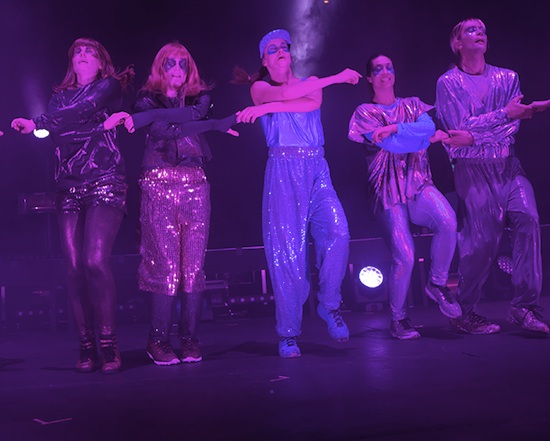The Knife’s most recent album Shaking The Habitual has been a jolt for fans of their stellar but increasingly safe electronic pop. True to the title’s sneer at comfort, it marries pop, post-punk, drone and techno to thrillingly disorienting effect. It is also their most overtly political record to date, wielding a vicious attack against a triumvirate of hegemonies: environmental degradation, the ‘dysfunctional culture’ of birthright and extreme wealth, and gender privilege. The lyrical challenges The Knife mounted to the latter injustice are obvious in track titles such as ‘Oryx’ and ‘Crake’ (after the Margaret Atwood novel), and lines such as "Not a vagina / It’s an option / The cock / Had it coming". Karin Dreijer Andersson also lays waste to received ideas of feminine prettiness by singing in a desexualised vocoded groan, and the songs brim with jarring, ugly timbres – shattering glass, industrial drums and queasy synths. It all makes for a brutal, unsettling, fantastic work, their most challenging and exciting yet.
But for all its many, many merits, Shaking The Habitual was not written with live performance in mind, at least not in the conventional sense. And thank god for that, because few things are more torturous than watching a band play their album by rote, oblivious to the audience, or a dead-eyed producer standing behind a laptop triggering loops. Writing the kind of album that included feedback recorded from a boiler room and a broken bedspring used as an instrument presented the kind of live challenge you imagine The Knife would relish. On the face of it, they had two options: bore everyone silly by pretending to perform the whole record live between only the two of them, when of course such a thing is impossible, or replicate the whole thing faithfully onstage with a large band – an act that by definition would violate Shaking The Habitual‘s centrally transgressive qualities.
Naturally, they do neither, instead choosing to rewrite the definition of what constitutes live performance. Their concert at Camden’s Roundhouse is a triumph of displacement and mistaken identity. Unmasked they now may be, but Karin and Olof are as unidentifiable as ever. A troupe of men and women, in glittery cowls that make them look like Sunn O))) gone disco, emerge from the dense smoke onstage. Between them they play a tinselled harp, something that looks like a cross between an ocarina and a didgeridoo, a behemoth of a stringed bass, drums that look and sound like bones, and all manner of shakers and handheld (and no doubt handmade) percussion. By the third track ‘Bird’, one of the few not from Shaking The Habitual, the sequinned Ringwraiths have all but abandoned their instruments and given themselves over to full-blown dancing.
Stage right, one woman who is all fringe and glitter takes to the mic, and the audience cranes to catch a glimpse of the woman we assume is Karin Dreijer Andersson. Assume being the operative word: over the course of the evening, each member of the troupe, and often more than one at a time, lip-syncs the vocal parts of the songs, so that all and none of them are Karin. No effort is made to conceal that the bulk of the music is provided by a backing track. At one point, Karin (or ‘Karin’) sits at a piano, sings (or ‘sings’) and plays exactly nothing, hammering home the pretense that inheres in performance. For ‘Got 2 Let U’, a gold frame containing a blank canvas is wheeled onstage, and an androgynous lip-syncing face projected onto it. It’s comical and even a bit grotesque, but it also sums up what this show is about: the falsity of live performance, the instability of preconceptions, and the premise of gender as a societal construct. Here, everyone’s an unreliable narrator.
As they remove themselves from the audience’s visual focus and blend in with their backing performers, Olof and Karin spread the privilege engendered by the cult of personality across their whole troupe, bringing to life the album’s principle of equality. Similarly, the music is presented as equal to the visual elements, so that the overall impression is closer to performance art or audiovisual exhibition than pop concert proper. The Knife highlight artifice as the fulcrum of all performance, and in doing so take a self-referential, probing look at its effectiveness as a tool for subversion.
That’s not to say it’s all serious-face postmodernism; on the contrary, gender politics and identity displacement notwithstanding, it’s a lot of fun. When it’s choreographed, the troupe’s dance is heavily stylised, all staccato air-punches and synchronised jerks. But when the dancers are freer, they move with all the fluidity of lithe ravers. The thick pastel-lit smoke gives way to bright strobes in migraine colours that bounce off their costumes in thousands of self-replicating spectrums. The lugubrious coldwave and drone moments on Shaking The Habitual are largely left off the setlist in favour of tracks such as the white-hot techno cut ‘Networking’ and the percussive synth-pop onslaught of ‘Full Of Fire’. By the time the unmistakable opening notes of closer ‘Silent Shout’ come in, between the strobes and beats, the Roundhouse resembles nothing so much as a superclub filled with devotees. It segues into Hannah Holland’s DJ set – throbbing Vitalic-esque electro that in any other context I’d loathe. Yet it fits the moment perfectly: gloriously camp, libidinous and a bit silly.
I won’t pretend that everyone loved The Knife’s show as much as I did. The crowd thinned noticeably towards the end, and afterwards Twitter was aflame with some seriously bristling iPhone warriors. I wonder what those who didn’t enjoy it expected: jangly electro-pop of a Deep Cuts-era Knife, maybe, or the smoky gloom of a Fever Ray show. Elsewhere I’ve argued that Shaking The Habitual‘s great achievement is its drive to defamiliarisation. At the Roundhouse, The Knife bring that spirit to life, leaving us in no doubt as to performance’s endless capacity for disruption.



